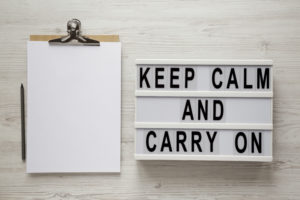With the COVID-19 outbreak, the world at large has come to a screeching halt. But, that does not mean all operations can afford to stop. A homeowners association, for instance, faces the question of whether it is acceptable to continue to collect assessments during the coronavirus crisis.
Why the HOA Should Collect Dues During Coronavirus
The coronavirus pandemic is a health crisis faced by the world. Across the country, businesses are temporarily shutting down and employees are getting laid off or forced to go on unpaid leave. The United States is looking at an economic downturn as the number of cases continues to rise.
However, businesses are not the only organizations affected by the outbreak. HOA communities everywhere are also responding to the coronavirus crisis.
One matter of note is the suspension of collecting dues. Many HOA boards are undoubtedly considering whether or not to continue to collect dues during COVID-19. After all, people have lost their source of income and may be unable to settle their monthly dues.
So, the question remains, should the HOA continue to collect dues during the coronavirus pandemic? The short answer is yes. While some might criticize this as an unsympathetic decision, there are two major points that support this argument. Let us break them down below.
1. No Other Source of Revenue
The first reason why HOAs should continue to collect HOA dues is that most associations have no other source of revenue. Money does not just grow on trees, and homeowners agreed from the very beginning to pay monthly fees in exchange for various amenities and services.
Unless your HOA has other lucrative sources of income, pausing the collection of homeowner association dues is unwise.
2. Expenses Continue to Be Incurred
 Even at a time like this, your HOA will continue to incur fixed expenses. This includes expenses related to landscaping, maintenance, trash removal, and security — all paid to vendors.
Even at a time like this, your HOA will continue to incur fixed expenses. This includes expenses related to landscaping, maintenance, trash removal, and security — all paid to vendors.
Other than that, you also need to pay your HOA management company and attorney, if applicable. Some vendors may give you more time to settle your payments, but the money still has to come from somewhere.
When you stop collecting condo dues, you are basically digging a hole filled with debt for your HOA.
The Adverse Effects of Halting Collection
Even though a lot of businesses have indefinitely stopped operations, an HOA cannot just drop everything in the same way. While some services are not essential, others need ramping up.
Cleaning services, for instance, must continue. Since COVID-19 is so easily transmitted, every surface requires disinfecting, especially items that frequently come into contact with people such as elevator buttons and door handles.
When an HOA stops collecting dues, vendors are left unpaid and debt can quickly pile up. This will eventually lead to a strained working relationship with your vendors.
Services may also stop when vendors are not paid, resulting in a number of consequences. Soon enough, uncollected trash will accumulate and amenities will not get the maintenance they need.
Additionally, it is important to collect association dues for the benefit of the homeowners themselves. When you let dues defer, homeowners will get stuck with a mountain of debt to pay off.
The amount will eventually snowball until the figure becomes too large for residents to pay in one go. It is infinitely more manageable to pay $100 every month than a lump sum of $1,200 that has stacked over time.
Furthermore, should a homeowner become delinquent as a result, the HOA will be forced to collect the fees through other means. This includes placing a lien on the property, filing a lawsuit against the homeowner, and foreclosing.
These options are time-consuming and inconvenient. From these perspectives, when you stop collecting dues, both the HOA and the homeowners will suffer in the end.
Consider Setting Up Payment Plans
 While it is essential to continue to collect dues during the coronavirus crisis, that does not mean the HOA should not take the situation of residents into account. If a homeowner comes forward and asks for some sort of consideration, the HOA board should look at the options. One reasonable option is to set up a payment plan.
While it is essential to continue to collect dues during the coronavirus crisis, that does not mean the HOA should not take the situation of residents into account. If a homeowner comes forward and asks for some sort of consideration, the HOA board should look at the options. One reasonable option is to set up a payment plan.
Of course, this in no way implies that the board should just offer a payment plan for every resident who complains about dues. The board must first inspect whether or not the resident is truly incapable of paying dues. It is also not recommended to offer payment plans to all residents. Instead, handle each request as they arise.
In addition to setting up payment plans, the HOA board should take the necessary steps to reduce monthly expenses. It is worth noting that these options do not apply to all HOAs. Moreover, it is important to consult with your attorney and HOA manager first before adopting any of the following:
- Temporarily reduce non-compulsory services, keeping in mind that this must not have a negative effect on the property values or the association itself
- Postpone non-urgent construction or repairs
- During budget preparation, reassess the coming year’s expenses
- Waive or delay late fees and interest
Borrowing from Reserves
At a time like this, associations will naturally consider all alternatives, including borrowing from the reserve fund to cover expenses. Whether or not this is allowed depends on your state laws and governing documents.
For instance, in California, the reserve fund is solely for the restoration, replacement, repair, or maintenance of major association components. However, according to Civil Code § 5515(a), an HOA can transfer funds from its reserves to its operating fund in order to “meet short-term cash flow requirements or other expenses.” Though, the HOA must restore these funds within a year.
Keep Calm and Carry On
 As more and more COVID-19 cases are reported, it is normal to feel unsure or lost. Like others, HOAs are going through a crisis that is entirely unfamiliar to them. It is understandable to want to stop collecting dues as a symbol of compassion toward residents.
As more and more COVID-19 cases are reported, it is normal to feel unsure or lost. Like others, HOAs are going through a crisis that is entirely unfamiliar to them. It is understandable to want to stop collecting dues as a symbol of compassion toward residents.
However, such an action would only harm the HOA and its members in the long run. In the case of whether an HOA should continue to collect dues during coronavirus, the answer is most definitely yes.
If your HOA is having trouble during this time, it is beneficial to consult with an HOA management company like us. Should you decide to do so, give us a call.
RELATED ARTICLES:
- HOA Board Members And Covid-19: Duties And Responsibilities To The Community
- Homeowners Association Meeting Protocols – Coronavirus Covid-19
- Coronavirus Activities For Community: Staying Together Despite The Distance






